
Sound familiar?
‘When she was in the depths of despair, the tide of publicity turned against her. She was no longer the fairytale princess, but the royal shopaholic who had lavished a fortune on an endless array of new outfits.
It was she who was held responsible for the steady stream of royal staff who had left their service and it was she who was accused of forcing her husband to abandon his friends, change his eating habits and his wardrobe…
At a time when dark thoughts of suicide continually crossed her mind, a Mail columnist described her as a “fiend and a monster”.’
Oh no, please. Not Meghan again!
Don’t worry. It isn’t. This passage (with slightly doctored words in bold) was written 30 years ago. It refers to Diana, Princess of Wales. But the accusations are remarkably similar to those levelled against the Duchess of Sussex, selfish profligacy, bullying, even the reorganisation of her husband’s clothes and diet. In those days, it was Nigel Dempster, rather than Sarah Vine or Jan Moir, putting the boot in while a beleaguered woman in a gilded cage considered taking her own life.
The words are taken from Andrew Morton’s book “Diana: Her True Story”, published in 1992 and updated first to take account of her separation from Prince Charles and then, after her death, to confirm what everyone already knew: this was Diana herself, rather than “insiders” and “friends” and “sources” speaking.
I had another read of it last week when the sky fell in on the BBC over that interview by Martin Bashir and everyone, from the second in line to the Throne to the lowest-rent tabloid columnist, ventured out with their bucket of scorn.
The deceit used to secure the interview was reprehensible and the cover-up of the wrongdoing – most especially the destruction of an innocent graphic designer’s career – disgraceful. But that doesn’t negate the content of the conversation. As she had demonstrated with the stream-of-consciousness tapes she sent to Morton three years earlier, this was a woman desperate for her voice to be heard. She was right that there were “three people in the marriage”; she was right that, even without that fatal car crash, she was destined never to be Queen. So, was she wrong to say she felt isolated in the Palace, that she didn’t know how to deal with Press attention, to speak out about her bulimia and self-harming?
There is so much in that interview that echoes down the years and is still relevant today – as demonstrated by the whole Harry and Meghan mess – that it should be defended as an important piece of modern history from which lessons can and should be learnt. But instead, the BBC dons a hairshirt and its Press detractors leap on Prince William’s outrageous demand that it never be shown again. Meanwhile, politicians who already have an agenda that includes reining in the corporation, seize the opportunity to kick it while it’s down.
The sanctimoniousness of the Press here is quite something. All this happened 25 years ago and was, according to the BBC, the work of one “rogue reporter”. The subsequent investigation was shoddy; it beggars belief that, confronted with evidence of Bashir’s lie after lie that then head of news – later Director-General – Tony Hall should conclude that he was essentially an honourable man. Hall, now ennobled, moved from the BBC to become head of the National Gallery from which he resigned last week – as a Times leader demanded he should.
Two sections of that leader stand out:
“There is no question that Bashir was a rogue reporter. But as Lord Dyson reveals, the BBC was well aware when it conducted its own investigation in 1996 that Mr Bashir had lied to them on three occasions… Indeed, the BBC's subsequent efforts to cover up for their rogue reporter are as serious a breach of journalistic standards as Mr Bashir's deceptions.”
And
“What is particularly galling is that those most culpable have gone on to enjoy successful careers.”
Rather more recently than that Diana interview, another news organisation used disreputable means to get the stories it wanted. It, too, blamed a “rogue reporter” – the very same phrase. It, too, carried out what it later admitted was a flawed internal investigation and then instigated a cover-up. That was rather more extensive than the BBC’s and involved the Metropolitan Police and the systematic shredding of millions of possibly incriminating emails.
The “most culpable” went on to work in Downing Street before resigning and ending up in jail. His boss (and lover), who apparently knew absolutely nothing about what was going on at the newspaper she edited, went on to become chief executive. She, too, resigned. But, cleared by the courts of any wrongdoing, is back at the helm of the company that owns The Times.
Some phone-hacking victims find that particularly galling.
Ofcom: back to the drawing board
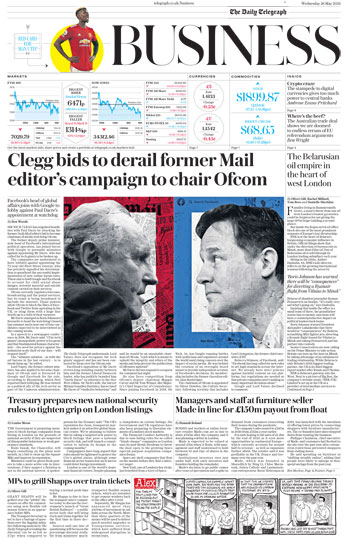
So, who is to rein in the Beeb? The Prime Minister would like it to be Paul Dacre.
Unfortunately, the panel which interviewed four candidates for the post of head of Ofcom disagreed. And so the whole process is to be started again from scratch.
The procedure for such public appointments is for the selection panel to put forward to ministers the names of those it thinks fit the job description. It doesn’t recommend who should get the gig, but it can say that it regards a candidate as “unappointable”. If ministers prefer that person to those on the “ok” list, they can overrule the panel, but they have to consult with the public appointments commissioner first – and give an explanation as to why they are going off piste.
Is that what happened with Dacre? If you read the Guardian, it seems so. It wouldn’t be so strange: Ofcom oversees virtually every aspect of our communications, from broadcasting to broadband, from mobile phones to the Royal Mail. Is a technophobe man who doesn’t like to use a computer the ideal person for the role – quite aside from his much-voiced antipathy to four of the big organisations he would be regulating: the BBC, Channel 4, Facebook and Google?
If, on the other hand, you read the Telegraph, the difficulty may lie elsewhere.
For the Telegraph, the problem was not the paucity of candidates, but those evil twins Google and Facebook – in the guise of former LibDem leader Nick Clegg, which were guilty of “very heavy lobbying” against Dacre. Also, some candidates had, the Telegraph reported, been “marked down” for saying they wanted to reform the regulator, for not wanting to rock the boat – which is exactly what Boris Johnson and Culture Secretary Oliver Dowden want the new chair to do. And, on top of that, some panel members had reportedly declared conflicts of interest too late in the process.
So, the whole thing is to be re-run with a new panel, probably under the watchful eye of a new Public Appointments Commissioner. Peter Riddell’s five-year term in that role should have ended in April, but he is to carry on until September because the Cabinet Office was not ready to announce its preferred candidate to take over – even though the interviews were held to schedule in the winter. It will be interesting to see who gets his job and who makes it to the new Ofcom selection panel.
In the meantime, it’s worth considering some concerns raised by Riddell over recent months about the Government wanting to tilt the process so that like-minded people are put in positions of influence – particularly with regard to the make-up of interview panels – and the fact that leaks such as that about Johnson wanting Dacre have a negative effect on the whole enterprise because they deter talented people from applying. It seems only ten put their names forward to head up Ofcom, when normally dozens would have a go at such a job.
And so, all those fine words about diversity go out of the window.
Covering Cummings
Dominic Cummings’s appearance in front of the health and science select committees was riveting – a whole day’s gardening lost. It also added a rare frisson to the first glance at the next day’s papers. It is usually possible to guess which way any given title will go, but there were so many angles to his testimony, so many killer soundbites. I would suggest the key elements fighting for prominence were:
- Tens of thousands of unnecessary deaths
- The PM unfit for office
- Hancock a liar who should have been sacked 15-20 times
- The new Durham story
- “We’re *******”
And then there were the “mea culpas”, the fact that this was obviously a man with an axe to grind, plus the Carrie, Dilyn, bomber Trump and Shakespeare biography diversions. Such a tantalising menu.
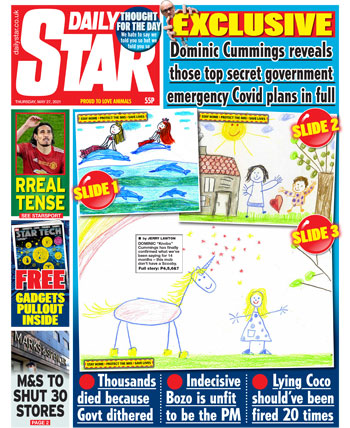
The Guardian, i and Mirror were easy: “Tens of thousands of people died who didn’t need to die.” The Times was generic with “Cummings rains fire on No 10” while the FT was more focused with its “Johnson unfit for office” line. I’d probably claim both of those – though perhaps only half a point for The Times because while I’d have predicted an umbrella headline, I’d never have come up with that wording.
The Mail and Metro both went with “Domshell” – it’s obvious when you see it, but the trick is to think of it at the time. Metro matched that with five separate heads, all attacking the Government. The Mail also ran five subsidiary heads, but where none of Metro’s pointed up Cummings’s motivation or failings, the Mail noted that he was taking “toxic revenge” and that he hadn’t told the truth about the Barnard Castle episode. In other words, the most polished paper in Fleet Street once again covered all bases.
The Telegraph combined the revenge with attacks on Johnson and Hancock in a workmanlike splash heading and then upped its game with three nifty character assessments on the two ministers and the former aide as the sub-heads.
Now it was time for the comic cuts. The Sun mocked up an optician’s board with “Do you need a hindsight test, Mr Cummings?” which looked all wrong – the typography just didn’t work at all – which was a pity as the idea was a fair one for a Johnsonite paper. And it looked even weaker when set against the Star, easily the wittiest tabloid on the street these days, which picked up the whiteboard theme with a set of children’s drawings suggesting that everything was sunshine and happiness when the opposite was the case.
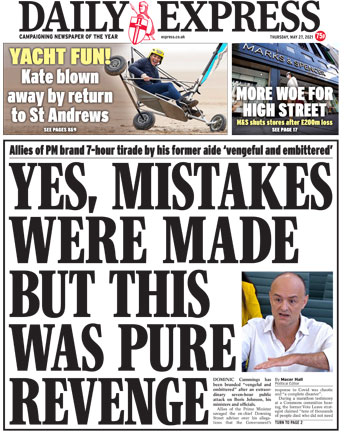
Then came the biggest surprise of all – or should I say shock: we knew the Express was ultra-loyal to whoever happens to be Conservative Prime Minister and ultra-soothing to its readers, but I never expected “Yes, mistakes were made, but this was pure revenge” under a strapline “Allies of PM brand 7-hour tirade by his former aide as ‘vengeful and embittered’”. Whatever happened to telling readers what the subject of your main story actually said rather than what you and Johnson’s friends think about it?
There was obviously reams more coverage inside and through the week as columnists had more time to digest what Cummings had said, and it didn’t take long for the pendulum to swing the Prime Minister’s way. In the end, Cummings hadn’t told us anything we didn’t already know or suspect and anyway the public have never trusted him. Those vaccines really are a panacea.
Nothing to see here
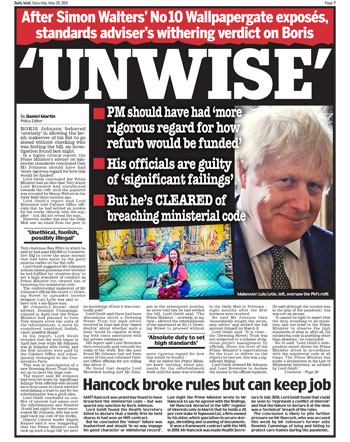
Compared with the Cummings storm, the price of wallpaper seemed a small inconvenience for our buffeted leader.
Most of us embarking on a bit of home decorating would think about how we were going to pay for it before loading up the trolley with paintbrushes and curtain swatches. We would certainly expect to have to stump up ourselves, rather than assume that some fairy godmother would appear waving a bit of plastic or open cheque book. But not, apparently, Mr Johnson. He had “no idea” who was going to pay for the refurbishment of his Downing Street flat.
This, according to the new adviser on the ministerial code (the old one quit when Johnson rejected his “advice” on Priti Patel) was “unwise”.
Quite a mild rebuke, especially coupled with Lord Geidt’s finding that he hadn’t broken the code. Instead, it was officials who took the flak for “significant failings” in not offering the Prime Minister advice or undertaking rigorous project management once the work was under way.
The Geidt report must have come as a surprise to the Mail, which has been the most questioning and outspoken on the whole enterprise – with much of its displeasure inevitably aimed at Carrie. Geidt’s verdict was reported on page 7, which seemed fair. The Hartlepool by-election had proved that the Prime Minister was right in asserting that voters didn’t care and now the code guru didn’t seem bothered either. But the paper wasn’t going to let go without a last swipe. The bottom leader concluded: “Our poll today shows that this and other controversies have had no effect on Mr Johnson's popularity. The vaccine's success rightly has him surfing a wave of approval. But propriety matters. If you want to buy something or have work done, you should know where the money is coming from to pay for it. No one should need to be told that, least of all the Prime Minister.”
It is now gunning for Priti Patel and her lobbying.
Stop press: engaged couple to marry

With all those little local difficulties seemingly out of the way, it was time for celebration. The Sun had primed us on Monday last week with its splash “Boris to marry Carrie” – possibly the least revelatory headline this century, given that they had announced their engagement in February last year and that generally means that a couple intend to marry.
And of course, they did – on Saturday. But hadn’t Harry Cole’s “exclusive” said it was going to be on July 30 next year? How embarrassing to be proved wrong so quickly.
But was he? We’ll have to wait until next summer to find out. His story didn’t refer to an actual wedding day, but to the celebration. In these Covid days many couples have chosen to marry now, party later. Once again, the Prime Minister proves to be in tune with the people. What a pity for Mr Cole that his story didn’t say that.
In the meantime, the Sun had two further “exclusives” on the secret nuptials that were on every Sunday and Monday front page.
And finally, the weather
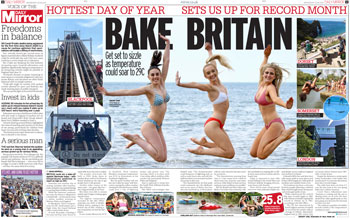
Phew! What a scorcher! The sun has finally come out and so have the “hotter than the Algarve” weather stories. It’s newspaper law (or maybe that should be lore?) that when it is cold, you compare Britain with somewhere in Russia or the Arctic and when it’s hot you go for a summer holiday destination. Or Australia: we tend to think of it as always sunny there, but the chances are that we’ll beat it on a fine summer’s day – given that it’ll be winter Down Under.
Another rule is that temperatures are given in centigrade when it’s cold (“Brrrrr! It’s 25°” doesn’t quite work) and Fahrenheit when it’s hot and we can have 90s or even 100 in a headline. It’s nonsense, of course. Nobody of working age was taught Fahrenheit – or, indeed, inches, feet, pounds or stones – at school. But it’s the law / lore.
It is also tradition to throw the weather story at one of the more junior reporters, who will pack it with the comparisons above, a line about people sunbathing or snowballing in parks, and a lot about traffic jams. Again, this is crazy. As a nation, we are obsessed with the weather, we can’t help ourselves and we actually read these stories where we might skim over everything Cummings, Johnson, Starmer and co say or do. They require writers with a bit of style, not someone going through the motions.
To my mind, there is one undisputed king of the weather story: Tom Whipple of The Times. Here he is at work, back in March 2012, when the clocks were about to go forward:
“The signs are there if you know where to look. B&Q is stockpiling barbecues. Sainsbury's has ordered emergency sausages. In Wiltshire, the River Bourne is so low that the village of Collingbourne Ducis has cancelled its annual rubber duck race. And, if you go outside, you won't need a jacket.”
Since then, he has become the paper’s science editor, so has been rather busy on matters virological rather than meteorological of late. But he turned up last week to offer us hope for an end to the dull and dank days of the past month:
“There is, scientists tell us, light at the end of the tunnel. We can see a way out of our gloom – a glimmer of sunshine after the long dark weeks of our collective national trauma.
No, it is not the metaphorical sun of the vaccine. It is the literal sun, of the sun….
We are, in other words, about to experience the joys of a fairly mediocre British spring – albeit just before the start of what should be a British summer.”
We might be “reckless” enough to leave the house without an umbrella or “tentatively consider wearing a t-shirt”, he says, adding sheer joy to the core information from forecasters that we need.
Meanwhile the rest of Fleet Street has spent the past three days pulling out all the clichés – to such an extent that I wondered whether the Mirror was being ironic with the central photograph on this spread yesterday (although at least it gave the temperature in centigrade).
Time to get my dose of Vitamin D.
Liz Gerard’s Notebook is a fortnightly column published in the InPubWeekly newsletter. To be added to the mailing list, enter your email address here.












